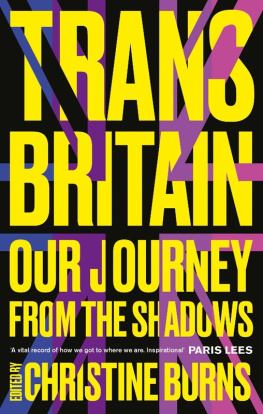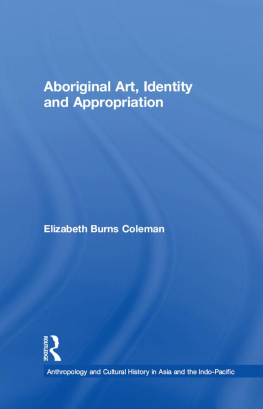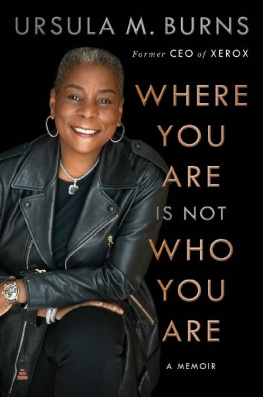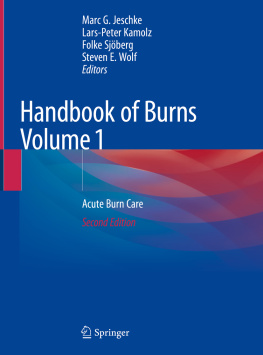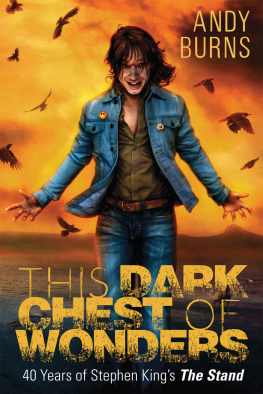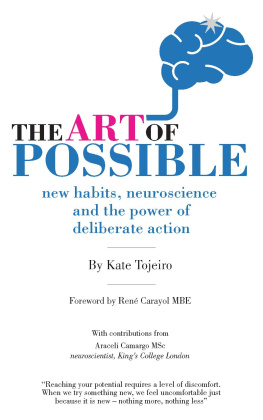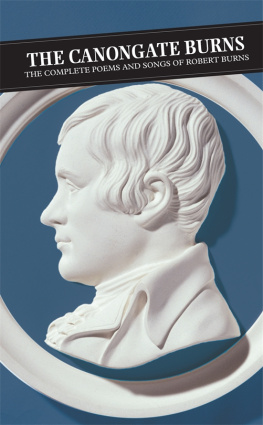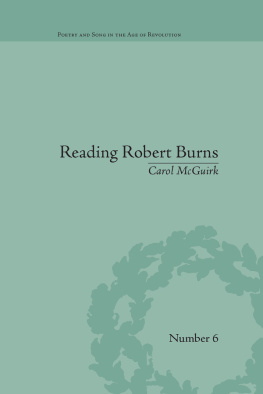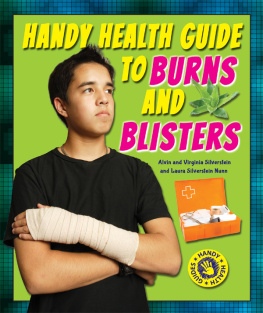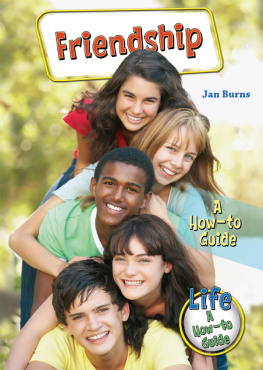
Christine Burns MBE has campaigned for a quarter of a century for the civil rights of transgender people, and has been involved with the trans community for more than forty years. She has worked as an equalities consultant, helped to put together new employment legislation and the Gender Recognition Act, and wrote the first ever official guidance about trans people for the Department of Health. She lives in Manchester.
by the same author
BY THE SAME AUTHOR
Fishing for Birds
Pressing Matters
Making Equality Work (with Shahnaz Ali and Loren Grant)
Edited by Christine Burns MBE
Mermaids is the only charity in Britain specifically focused on supporting whole families with a transgender child or parent. Established in 1995, the organisation has always been parent led, and does vital educational and support work.
This is a book largely about the lives of adult transgender people. But many (if not all) grown-up trans people have a story to tell about their youth usually involving the fear of expressing who they were and the negative and irreversible bodily changes that they have had to deal with as a result of going through the wrong puberty.
Our hope is for a future where another generation doesnt face that need to hide and suffer in silence, with all the lost opportunity that involves.
Never doubt that a small group of thoughtful,
committed citizens can change the world;
indeed, its the only thing that ever has.
Margaret Mead, Anthropologist (190178)
Dear Reader,
The book you are holding came about in a rather different way to most others. It was funded directly by readers through a new website: Unbound. Unbound is the creation of three writers. We started the company because we believed there had to be a better deal for both writers and readers. On the Unbound website, authors share the ideas for the books they want to write directly with readers. If enough of you support the book by pledging for it in advance, we produce a beautifully bound special subscribers edition and distribute a regular edition and ebook wherever books are sold, in shops and online.
This new way of publishing is actually a very old idea (Samuel Johnson funded his dictionary this way). Were just using the internet to build each writer a network of patrons. At the back of this book, youll find the names of all the people who made it happen.
Publishing in this way means readers are no longer just passive consumers of the books they buy, and authors are free to write the books they really want. They get a much fairer return too half the profits their books generate, rather than a tiny percentage of the cover price.
If youre not yet a subscriber, we hope that youll want to join our publishing revolution and have your name listed in one of our books in the future. To get you started, here is a 5 discount on your first pledge. Just visit unbound.com, make your pledge and type trans5 in the promo code box when you check out.
Thank you for your support,
Dear Reader,

Dear Reader,
Dan, Justin and John
Founders, Unbound
CONTENTS
Foreword
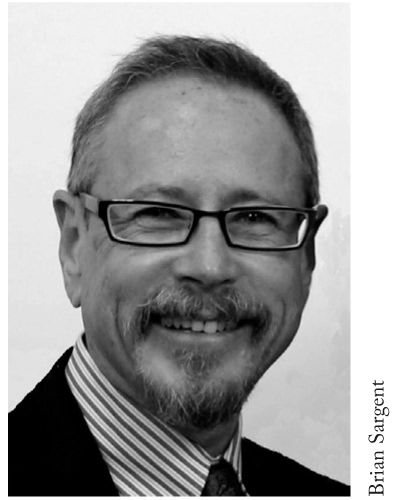
Dr Aaron Devor has been studying and teaching about transgender topics for more than thirty-five years and holds the worlds only research chair in transgender studies. He was one of the authors of versions six and seven of the World Professional Association for Transgender Healths (WPATH) Standards of Care and is overseeing the translation of version seven into world languages. He is a national award-winning teacher, an elected member of the elite International Academy of Sex Research, an elected Fellow of the Society for the Scientific Study of Sexuality, and has delivered more than twenty keynote addresses to audiences around the world. He is also the author of numerous well-cited scholarly articles, and the widely acclaimed books FTM: Female-to-Male Transsexuals in Society (2016, 1997), Lambda Literary Awards finalist The Transgender Archives: Foundations for the Future (2014), and Gender Blending: Confronting the Limits of Duality (1989). Dr Devor, an out trans man, is the founder and academic director of the worlds largest transgender archives, a former dean of graduate studies (200212) and a professor of sociology at the University of Victoria in British Columbia, Canada.
As Christine Burns has so aptly pointed out in this book, with all the media attention these days, it would be easy to be fooled into thinking that trans and non-binary people just appeared on the scene in the past few years. After all, it is almost impossible to look at any kind of media today and not see stories about trans and non-binary lives. Increasingly, commentators are working hard to be fair and accurate even as there is still a long way to go and more and more of them are trans and non-binary people themselves. However, as Christine illustrates in her introduction, the reality is that people who we would today think of as trans or gender non-binary have been around as long as we have been human (and probably even before that).
As the worlds only holder of a chair in transgender studies, the founder and academic director of the worlds largest transgender archives at the University of Victoria in British Columbia, Canada, and someone who has been around trans communities for more than thirty-five years, I know a very different reality. I know it from my own experiences as a gender nonconforming youth and adult, from countless hours spent with other trans people learning their stories from them, as a trans man, and from the history held in the extensive holdings of the Transgender Archives.
Im old enough to remember when it was illegal to be LGBT, and queer was still a word that people spat at you because they either knew that you were gay, or they thought you were queer because of the way you spoke, dressed or acted. Back then, there were transvestites, drag queens (drag kings were unknown even to most gay people) and transsexuals everything was very binary. As is so eloquently told by the narrators in part one, this was a time when everyone who was not straight (sexually or genderwise) lived in fear and, when they had the courage and the resources to seek out likeminded souls, gathered together in dark, hidden, out of the way places.
For trans and non-binary people of this era, locating others like themselves was fraught with possibilities for public disgrace and punishment. The overwhelming reality for trans and non-binary people, until the Internet changed it all, was profound isolation, secrecy, silence and shame. As you will read in the first-person accounts in this volume, pretty much every trans person over a certain age went through years, if not decades, of feeling that they were the only ones in the whole world who felt the way that they did; that they were unimaginable freaks for whom there were no respectable words or names. When they were unable, or unwilling, to hide their differences, the consequences were often dire: rejection by family and friends; loss of employment and housing; rejection by religious communities, social services and medical providers; incarceration in jails and mental hospitals; forced medication and electroshock; rapes; beatings; murder. There were no legal protections. There were no social support networks to speak of until the first pioneers started to band together into support groups in the late 1960s and early 1970s.
Next page
